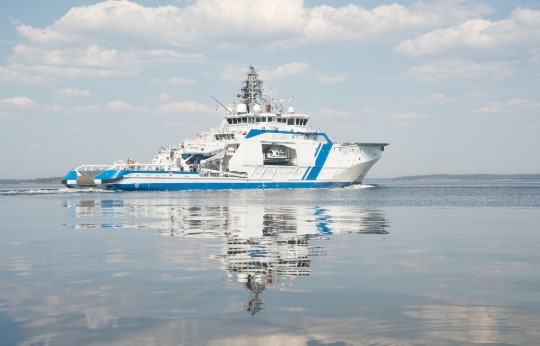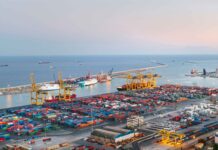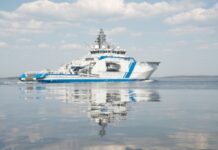The UK-led multinational Joint Expeditionary Force (JEF) has activated an advanced reaction system to track potential threats to undersea infrastructure and monitor the Russian ‘shadow fleet’ of sanctions-busting tankers in response to reported damage to a major undersea cable in the Baltic Sea, the UK Ministry of Defence (MoD) announced on 6 January 2025.
The high-readiness and adaptable 10-nation JEF – which includes Denmark, Estonia, Finland, Iceland, Latvia, Lithuania, Norway, Netherlands, Sweden and the UK, with the latter as the framework nation – has also released a statement expressing concern at the damage caused to the Estlink2 undersea cable, which carries electricity from Finland to Estonia, and highlighting the JEF’s commitment to working together to safeguard shared interests.
The operation, activated around the start of the year and named ‘Nordic Warden’, harnesses artificial intelligence (AI) to assess data from a range of sources, including the Automatic Identification System (AIS) that ships use to broadcast their position, to calculate the risk posed by each vessel entering areas of interest. The JEF action reinforces existing and planned NATO responses.
Specific vessels identified as being part of Russia’s shadow fleet have been registered into the system so they can be closely monitored when approaching key areas of interest. If a potential risk is assessed, the system will monitor the suspicious vessel in real time and immediately send out a warning, which will be shared with JEF participant nations as well as NATO allies.
‘Nordic Warden’ was activated under JEF protocols that provide a series of options to NATO that can be activated in order to protect against potential threats. “The initiative highlights how the JEF is using innovative technologies to boost collective European security, while supporting and complementing NATO’s own operations,” the UK MoD stated.
The move comes following reported damage on 25 December 2024 to the Estlink2 cable, which authorities in Finland suggest may have been caused by the tanker Eagle S, which forms part of Russia’s shadow fleet of vessels it uses to attempt to bypass international sanctions.
“The UK and JEF are leading the way in providing support to our allies to help safeguard the offshore infrastructure we all rely on against potential threats,” stated UK Defence Secretary John Healey. “’Nordic Warden’ will help protect against both deliberate acts of sabotage as well as cases of extreme negligence, which we have seen cause damage to underwater cables.
“Harnessing the power of AI, this UK-led system is a major innovation which allows us the unprecedented ability to monitor large areas of the sea with a comparatively small number of resources, helping us stay secure at home and strong abroad,” Healey added.
Twenty-two areas of interest – including parts of the English Channel, North Sea, Kattegat and Baltic Sea – are currently being monitored from the JEF’s operational headquarters in Northwood, just outside London, where personnel from all JEF nations work side by side.
‘Nordic Warden’ was first trialled during the summer of 2024 and again during the JEF’s Exercise ‘Joint Protector’, which saw more than 300 UK personnel deploy to Latvia to demonstrate the ability of the UK to deploy its operational headquarters for JEF abroad at short notice.
“The UK has led international efforts through a global alliance to disrupt the shadow fleet,” the UK MoD stated. “As part of the initiative launched by the [UK] prime minister at the European Political Community last year, the UK has sanctioned 93 oil tankers which [Russian President Vladimir] Putin has been using to soften the blow of sanctions and bankroll his illegal war in Ukraine. Today’s announcement complements last month’s agreement between the UK, Denmark, Sweden, Poland, Finland and Estonia to request proof of insurance from suspected shadow vessels as they pass along the Baltic route.”
Commenting on the reported Estlink2 damage, a JEF joint statement read, “This is another example of maritime incidents causing direct economic and security implications for Finland and Estonia, highlighting the risks to vital communication and energy networks essential for the security and prosperity of all our nations.
“The JEF commends Finland and Estonia for their decisive actions in dealing with the Estlink-2 power cable incident. We remain committed to supporting Participant Nations, NATO, and allies in safeguarding our shared interests and regional stability.”
The Finnish Border Guard boarded the tanker Eagle S on 26 December 2024 after it was suspected of dragging its anchor to break the Estlink 2 in an act of what the Finnish government has called “aggravated sabotage”.
The incident on 25 December was the latest in a series of attacks on Western undersea infrastructure.
On 17 and 18 November 2024 a Chinese bulk carrier, Yi Peng Three, is suspected of severing two undersea cables – one linking Sweden to Lithuania and the other between Finland and Germany – by deliberately dragging its anchor along the seabed for more than 160 km.
In October 2023 an undersea gas pipeline between Finland and Estonia was shut down after it was damaged by the anchor of the Chinese cargo ship Newnew Polar Bear.
On 26 September 2022 a series of underwater explosions and consequent gas leaks occurred affecting the Nord Stream 1 and Nord Stream 2 natural gas pipelines within the economic zones of Denmark and Sweden. Both pipelines were built to transport natural gas from Russia to Germany via the Baltic Sea.
In August 2024 it was reported that German authorities had issued a European arrest warrant for a Ukrainian national suspected of having used the sailing yacht Andromeda along with two others to sabotage the Nord Stream pipelines, although some sources have suggested this might have been a Russian ‘false flag’ operation.












